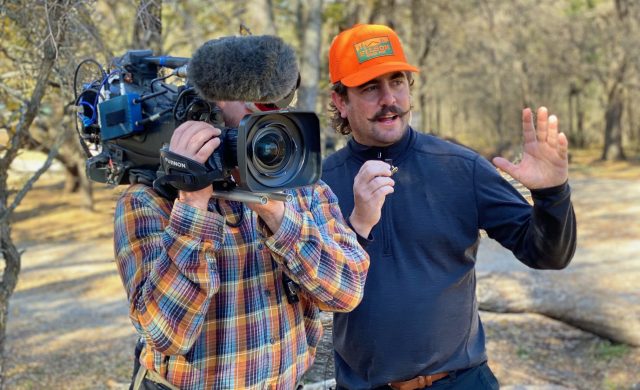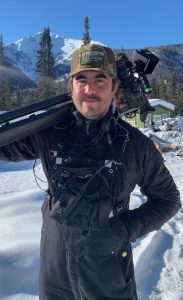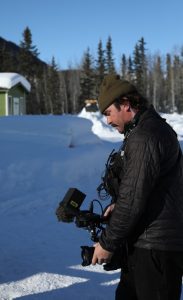
Southern studies alumnus Ben Cannon (right) works with a videographer on location during a shoot for the Discovery Channel. Submitted photo
OXFORD, Miss. – Ben Cannon has always enjoyed exploring new places, which is quite helpful for his job as a field producer for the Discovery Channel.
Cannon earned a bachelor’s degree in Southern studies from the University of Mississippi in 2003. Although his circuitous route has led him from ski towns in Germany to lodges in Wyoming and to city life in Brooklyn, his Southern roots have come in handy no matter where he is in the world.
“I’ve been filming ‘Homestead Rescue’ for the Discovery Channel,” said Cannon, on location just outside Fort Worth, Texas. “Typically, my wheelhouse is the Discovery Channel or Nat Geo, so it’s more rugged types of shows, often with individuals or families trying to survive in a place like Alaska, for example.”
According to its website, “Homestead Rescue” explores how the concept of living a scaled-down, simpler, off-the-grid life has gained popularity recently, but can be dangerous, especially for families who aren’t equipped with skills and live in isolated locations. Craftsman and survival expert Marty Raney – joined by daughter Misty, a farmer, and son Matt, a hunter and fisherman – attempt to teach these families essential skills needed to survive and thrive in the wilderness.
At the conclusion of each episode, which takes place in locations such as Montana, Texas, Georgia, Tennessee and Vermont, the new survivalists who are learning how to hunt, fish, garden and problem-solve, decide to either stay on the land or return to civilization.

Ben Cannon still relies on many of the lessons he learned as a Ole Miss Southern studies major, even when working on location in McCarthy, Alaska, for National Geographic. Submitted photo
“The show is about people who try to live a more self-sufficient lifestyle because they had a dream or maybe their life in a larger town wasn’t working out for them, so they got a piece of land, and oftentimes if people don’t have experience, things can go really awry, especially if you don’t have much in the way of money and resources,” Cannon said.
“We identify people around the country who are trying to homestead and are struggling, and the Raneys go in and help them turn things around.”
Cannon said it’s the kind of show where the homesteaders will often turn emotional midway through because of the generosity of the Raney family.
“I work on all kinds of different shows and this one has, I think, a really kind of quality message; it’s very positive, so I am grateful to be working on it,” he said.
In his role as field producer, he is the first person who meets the homesteaders when he goes out and scouts the area, so he establishes a rapport with them and learns their background.
“I figure out how the Raneys and the show can address what’s going on,” Cannon said. “Then I go back to my home office and I write the creative, which is sort of an outline based on what I predict the families need and help come up with fun little twists and turns along the way.”
One of his tricks, which he learned as a newspaper reporter in Wyoming, is to call the town or county office and ask who might have background knowledge about places to go.
“Townspeople can often connect you with the expert you are looking for,” said Cannon, who was born in Meridian and grew up in Monroe, Louisiana. “I’ve even done that before while we are driving somewhere and said, ‘OK, in three hours we will be in this town in Georgia; where should we eat?’
“So I’ll call the sheriff’s office and they tell us about the local barbecue place. It’s a great way to reach out for whatever you might be looking for – especially in the South.”
Teaching students a wide variety of skills through different disciplines is a big part of the Southern studies ethos, which Cannon enjoyed. He made it back to Ole Miss recently for a long-overdue visit.

Ben Cannon works on National Geographic’s ‘Life Below Zero: Next Generation,’ a show about individuals who have left their traditional lifestyles behind face a challenging new world off the grid in the wilds of Alaska. Submitted photo
“I’m very grateful to Southern studies, and it was so special to go back and visit Barnard Observatory,” Cannon said. “When I was in Ted Ownby’s History of Mississippi course, I began to learn a little bit about the Southern studies program and I just immediately got into it.
“Suddenly, I went from being a rudderless general studies major to someone who had found this really interesting, nurturing department where I had mostly small classroom experiences. I walked into Barnard and I knew everyone and they knew me, and it really kept me engaged.”
Cannon learned from David Wharton, former director of documentary studies.
“I would be very remiss not to thank the late, great David Wharton, who taught me how to think about taking a picture and storytelling,” he said.
Although Cannon wasn’t sure at first what he would do with his Southern studies degree, he realized after moving to Aspen he would need to find a profession, so he became a newspaper reporter in Wyoming. He later moved to New York and fell into documentary filmmaking.
“There are so many aspects of things and seeds that were planted in the Southern studies program that are completely tools in my skill set now, not least of all my interest in documentary work,” Cannon said.
“I think there’s some degree of adventure in getting a Southern studies major, with the freedom to take lots of different classes,” Ownby said. “Talking to Ben a few weeks ago, I realized his adventures continued in the various things he’s chosen to do since he graduated.”
Cannon also took a class taught by Charles Reagan Wilson, professor and longtime director of the Center for the Study of Southern Culture. One day, Wilson showed “Sherman’s March: A Meditation on the Possibility of Romantic Love in the South During an Era of Nuclear Weapons Proliferation,” a 1986 documentary about a young man’s pursuit of love as he loosely follows the path of Sherman.
“I can’t tell you how much I loved watching this film,” Cannon said. “It was the first time I saw a documentary that really grabbed me and I would say that’s where I first began to love documentaries.
“That hasn’t ended, and I never would have imagined working for Discovery, when we are often filming in the South but also places like Alaska, and I certainly feel very comfortable doing the work and interviewing, researching, doing critical and creative thinking, and all the things entailed in documentary work.”